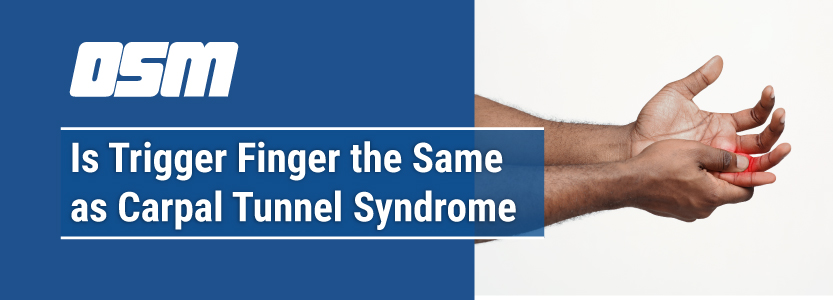Is Trigger Finger the Same as Carpal Tunnel Syndrome?
Article featured on Movement Orthopedics
Are you one of those people whose occupation involves flexing of the wrist day in and day out? If so, you may be at risk for carpal tunnel syndrome. But did you know that there’s another condition that you could be susceptible to if your job involves repetitive hand movements? It’s called trigger finger.
So, what’s the difference between these two conditions? Keep reading to find out.
What Is Trigger Finger?
Also known as stenosing tenosynovitis, trigger finger occurs when a tendon in any of the fingers (including the thumb) becomes inflamed and unable to easily glide through its sheath – the thin layer of tissue surrounding a tendon. Prolonged inflammation can lead to the formation of nodules in the tendon, which ultimately renders the affected finger unable to freely bend and straighten.
The symptoms of trigger finger can range from mild to severe, and can become worse over time. If you have trigger finger, you will likely experience any or some of the following symptoms:
- Clicking, popping, or snapping sensation when moving your finger
- Difficulty carrying out basic hand movements, especially those that involve gripping
- Locking of the finger in a bent position (can suddenly pop straight)
- Pain and tenderness at the base of your affected finger
- Stiffness in your finger (mostly noticeable in the morning)
Treatment
Your hand specialist will likely first take a conservative approach to treating your trigger finger. Your doctor may recommend that you rest your hands, wear a splint, and/or perform stretching exercises.
If your symptoms continue unabated, your hand surgeon may give you a cortisone shot to control the inflammation and allow the tendon to glide freely.
If your symptoms don’t respond to nonoperative treatment, your hand surgeon may recommend surgery, in which they will make an incision in the palm area of your hand to access the tendon sheath and cut it to give the tendon more room to move. Another option is percutaneous release, in which your doctor will use a needle to break up the constricting tissue around the tendon sheath, thereby allowing the tendon to move.
What Is Carpal Tunnel Syndrome?
Carpal tunnel syndrome (CTS) occurs when the median nerve – which provides sensation and motor function for the wrist, hand, and forearm – is compressed and unable to function properly.
CTS is also a progressive condition. However, unlike trigger finger, CTS is apparently neuropathic in nature, causing pain, shock-like sensation, numbness, and weakness, all of which can radiate up the forearm and make fine motor skills difficult.
Treatment
Rest, wearing wrist splints, and anti-inflammatories are the common nonsurgical treatments for carpal tunnel syndrome. If none of these provide adequate relief, your hand surgeon may administer cortisone injections to alleviate the inflammation and swelling.
If your symptoms persist despite a lengthy course of nonsurgical treatment, your hand specialist may recommend surgery. Carpal tunnel surgery involves your doctor severing the transverse carpal ligament to allow for more space in the carpal tunnel and consequently relieve pressure on the median nerve.
The Orthopedic & Sports Medicine Center of Oregon is an award-winning, board-certified orthopedic group located in downtown Portland Oregon. We utilize both surgical and nonsurgical means to treat musculoskeletal trauma, spine diseases, sports injuries, degenerative diseases, infections, tumors and congenital disorders.
Our mission is to return our patients back to pain-free mobility and full strength as quickly and painlessly as possible using both surgical and non-surgical orthopedic procedures.
Our expert physicians provide leading-edge, comprehensive care in the diagnosis and treatment of orthopedic conditions, including total joint replacement and sports medicine. We apply the latest state-of-the-art techniques in order to return our patients to their active lifestyle.
If you’re looking for compassionate, expert orthopedic surgeons in Portland Oregon, contact OSM today.
Phone:
503-224-8399
Address
1515 NW 18th Ave, 3rd Floor
Portland, OR 97209
Hours
Monday–Friday
8:00am – 4:30pm




